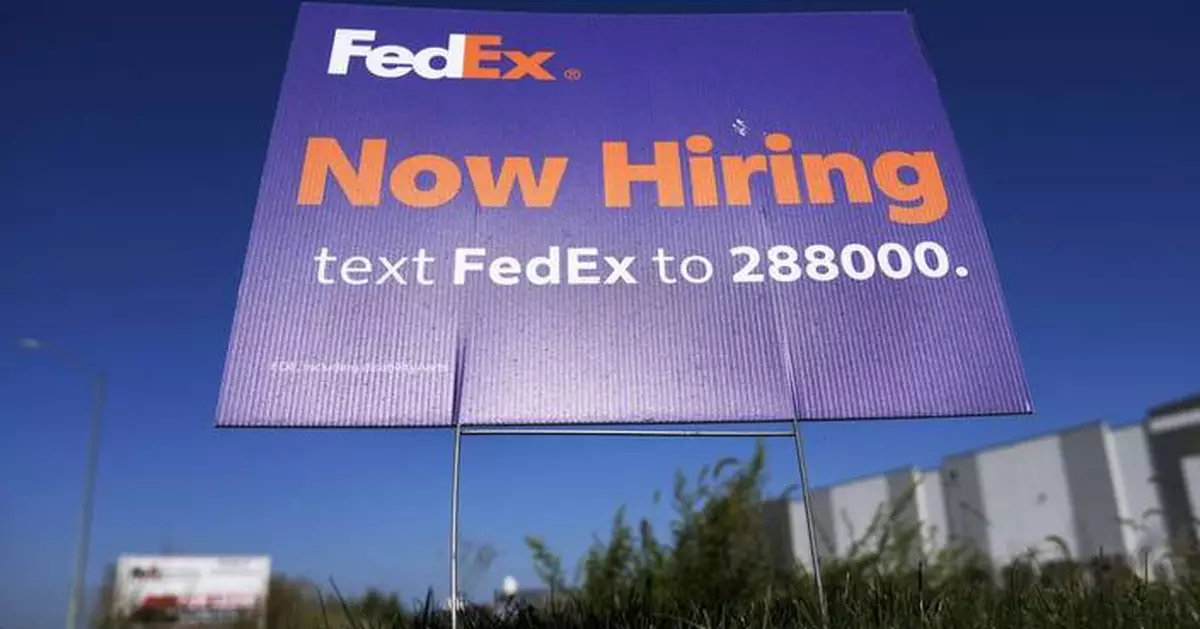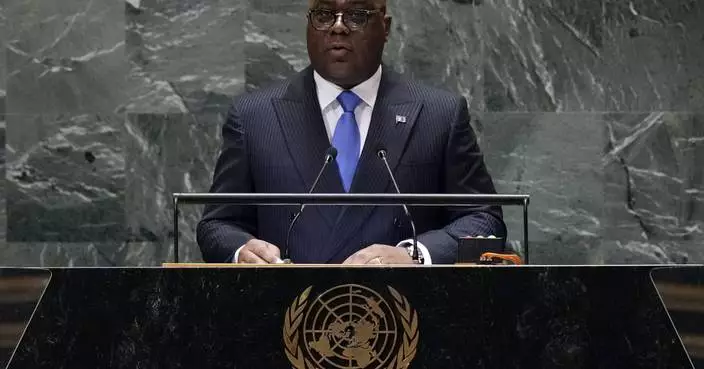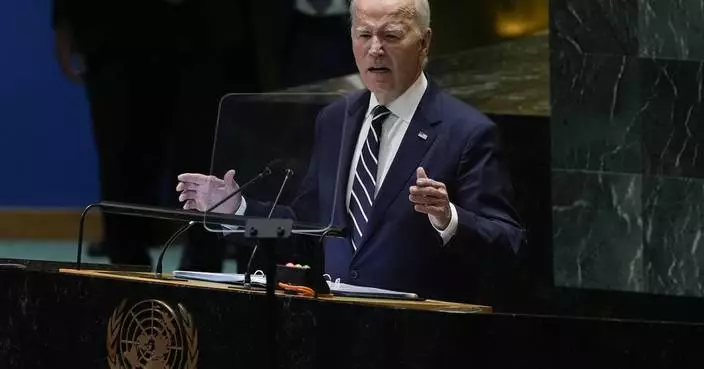The number of Americans applying for unemployment benefits last week fell to the lowest level in four months.
The Labor Department reported Thursday that applications for jobless claims fell by 4,000 to 218,000 for the week of Sept. 21. It was the fewest since mid-May and less than the 224,000 analysts were expecting. Last week's figure was revised up by 3,000.
The four-week average of claims, which evens out some of weekly volatility, fell by 3,500 to 224,750.
Applications for jobless benefits are widely considered a proxy for U.S. layoffs in a given week.
Weekly filings for unemployment benefits have fallen two straight weeks after rising modestly higher starting in late spring. Though still at historically healthy levels, the recent increase in jobless claims and other labor market data signaled that high interest rates may finally be taking a toll on the labor market.
In response to weakening employment data and receding consumer prices, the Federal Reserve last week cut its benchmark interest rate by a half of a percentage point as the central bank shifts its focus from taming inflation toward supporting the job market. The Fed’s goal is to achieve a rare “soft landing,” whereby it curbs inflation without causing a recession.
It was the Fed’s first rate cut in four years after a series of rate hikes in 2022 and 2023 pushed the federal funds rate to a two-decade high of 5.3%.
Inflation has retreated steadily, approaching the Fed’s 2% target and leading Chair Jerome Powell to declare recently that it was largely under control.
During the first four months of 2024, applications for jobless benefits averaged just 213,000 a week before rising in May. They hit 250,000 in late July, supporting the notion that high interest rates were finally cooling a red-hot U.S. job market.
U.S. employers added a modest 142,000 jobs in August, up from a paltry 89,000 in July, but well below the January-June monthly average of nearly 218,000.
Last month, the Labor Department reported that the U.S. economy added 818,000 fewer jobs from April 2023 through March this year than were originally reported. The revised total was also considered evidence that the job market has been slowing steadily, compelling the Fed to start cutting interest rates.
Thursday's report said that the total number of Americans collecting jobless benefits rose by 13,000 to about 1.83 million for the week of Sept. 14.
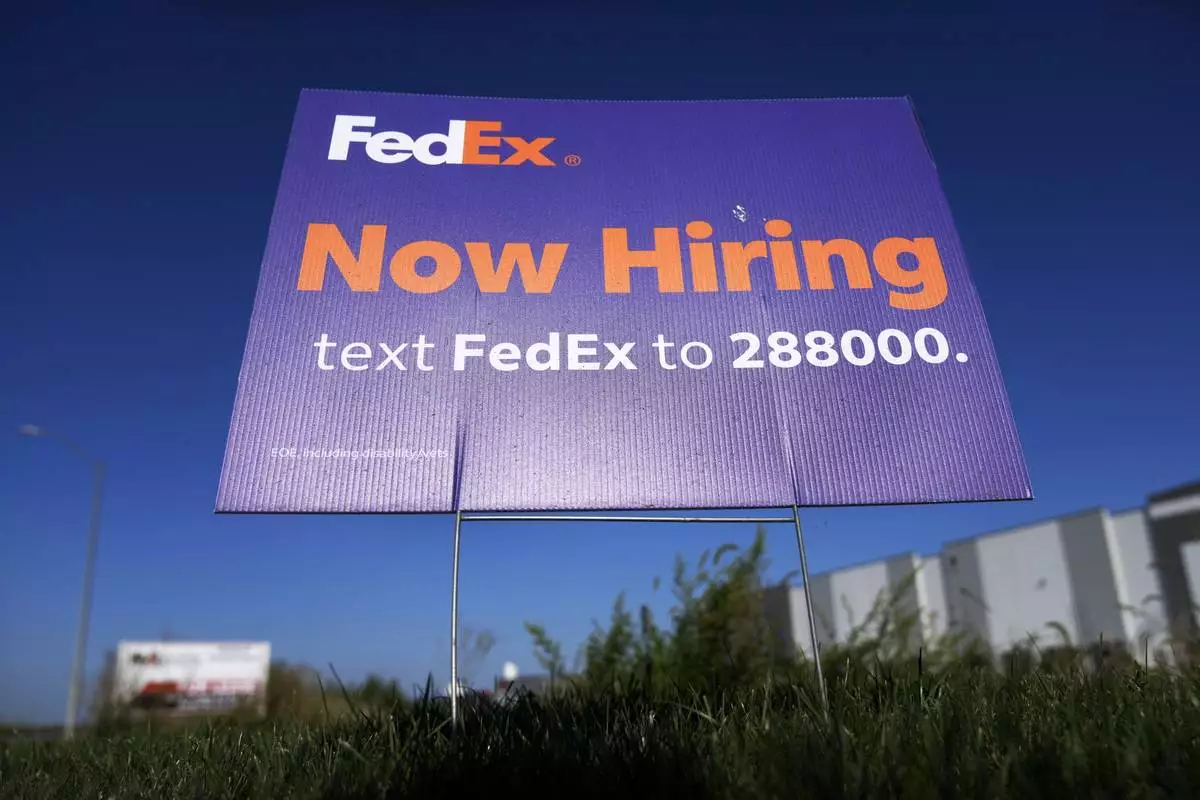
A hiring sign for employment at FedEx is seen, Wednesday, Sept. 4, 2024, in Grimes, Iowa. (AP Photo/Charlie Neibergall)
DALLAS (AP) — Leaders of Southwest Airlines are set to explain Thursday how they plan to remodel the airline to change with consumer tastes -- and maybe keep their own jobs.
They will give more details at an investor meeting about dumping so-called open seating, charging a premium for the best seats, and launching red-eye flights.
The changes to some of Southwest’s quirky habits are designed to reverse its shrinking profits and slumping stock price. It’s unclear whether the changes will work, but they could leave an airline that bears little resemblance to Southwest over the last 50 years — a carrier that still has a core of rabid fans.
Southwest has been contemplating an overhaul for months, but the push for radical change became even more important to management this summer, when Elliott Investment Management targeted the company for its dismal stock performance since early 2021.
While Thursday's meeting is aimed at investors, it will also be of keen interest to consumers, who should learn about how assigned seating and premium seats will work on Southwest. The open-boarding system it has used for more than 50 years will disappear, and passengers will be assigned seats, just like on all the other big airlines.
Southwest says its surveys show that 80% of its customers now want to know their seat before they get to the airport instead of picking among the open seats when they board the plane.
Southwest still lets passengers check two bags for free. CEO Robert Jordan said recently that Southwest has no plans to end that policy, but the airline has surveyed customers about it.
U.S. airlines brought in more than $7 billion in revenue from bag fees last year, with American and United reaping more than $1 billion apiece. Wall Street has long argued that Southwest is leaving money behind.
But Southwest has built years of advertising campaigns around bags-fly-free. Taking away that perk could change the airline's DNA as much as — or maybe more — than dumping open seating.
Tom Fitzgerald, an airline analyst with TD Cowen, said investors will be interested to see if Southwest introduces bag fees, a cut-rate “basic economy” fare, or offers changes to its Rapid Rewards frequent-flyer program.
The analyst said a major topic of interest to investors will be whether Southwest plans to reduce its flying next year instead of growing, and whether it plans to keep shrinking the workforce. Southwest expects to cut about 2,000 jobs this year through attrition.
Company management heads into the investor day having angered an important interest group: its own workforce. The airline told employees Wednesday that it will make sharp cuts to service in Atlanta next year, resulting in the loss of 340 pilot and flight attendant positions.
The pilots' union said it was “simply amazing” that Southwest was retreating in such a huge market “because this management group has failed to evolve and innovate.” That echoed a key Elliott talking point.
“Our flight attendants are overwhelmed. They are paying the price for poor management decisions on behalf of Southwest Airlines,” added Alison Head, a flight attendant and union official in Atlanta.
The unions are watching the fight between Elliott Investment Management and airline management, but they are not taking sides. “That’s between Southwest and Elliott, and we’ll see how it plays out,” Head said.
However, the unions are concerned that more of their members could be forced to relocate or commute long distances to keep their jobs. Southwest’s chief operating officer told employees last week that the airline will have to make “difficult decisions” about its network to improve its financial performance.
Elliott seized on that comment, saying that Southwest leaders are now “taking any action – no matter how short-sighted – that they believe will preserve their own jobs.”
The hedge fund controlled by billionaire financier Paul Singer now owns more than 10% of Southwest shares and is the airline’s second-biggest shareholder. The hedge fund wants to fire CEO Jordan and Chairman Gary Kelly and replace two-thirds of Southwest’s board.
Southwest gave ground this month, when it announced that six directors will leave in November and Kelly will step down next year. The airline is digging in to protect Jordan, however.
Elliott increased its pressure on Southwest this week by saying that it intends to call a special shareholder meeting as soon as next week to make the case for a board overhaul. Elliott has a slate of 10 potential nominees, including former airline CEOs.
“We do not support the company’s current course, which is being charted in a haphazard manner by a group of executives in full self-preservation mode,” Elliott said this week in a letter to other shareholders.
Jordan fired back on Wednesday, saying it is Elliott that wants to fly solo by lobbing “another negative press public ambush” instead of contributing to Southwest’s “transformational plan.”
“We’re willing to compromise, but acquiescing to a single shareholder’s demand for control of the company is not a compromise,” Jordan said. “There’s a lot to be excited about in Southwest, and we will not allow Elliott’s public attacks to distract us.”
Before Thursday’s event started, Southwest announced a $2.5 billion share-buyback program designed to make existing shares more valuable.
The airline also said that a third-quarter revenue ratio will rise by up to 3% instead of being between flat and down 2%, partly because Southwest gained passengers from other airlines during the CrowdStrike computer outage in July, which hit Delta Air Lines particularly hard. And it named a former AirTran and Spirit Airlines CEO to its board.
Shares of Southwest rose 6% in trading before the opening bell.
Shawn Cole, a founding partner of executive search firm Cowen Partners, whose firm has worked for other airlines but not Southwest, believes Southwest is too insular and should follow the recent examples of Starbucks and Boeing and hire an outsider as CEO. He thinks many qualified executives would be interested in the job.
“It would be a challenge, no doubt, but Southwest is a storied airline that a lot of people think fondly of,” Cole said. “If Boeing can do it, Southwest can do it.”
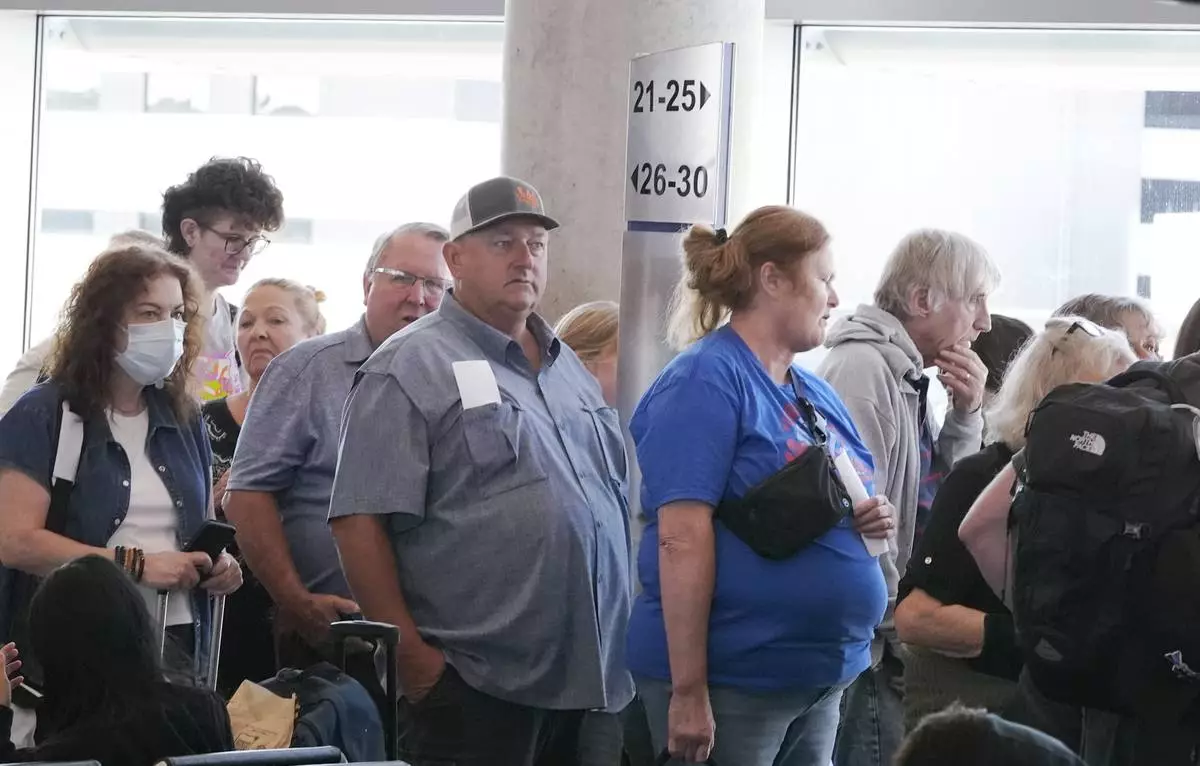
FILE - Travelers line up to board a Southwest Airlines plane at Love Field in Dallas, Thursday, July 25, 2024. (AP Photo/LM Otero, File)
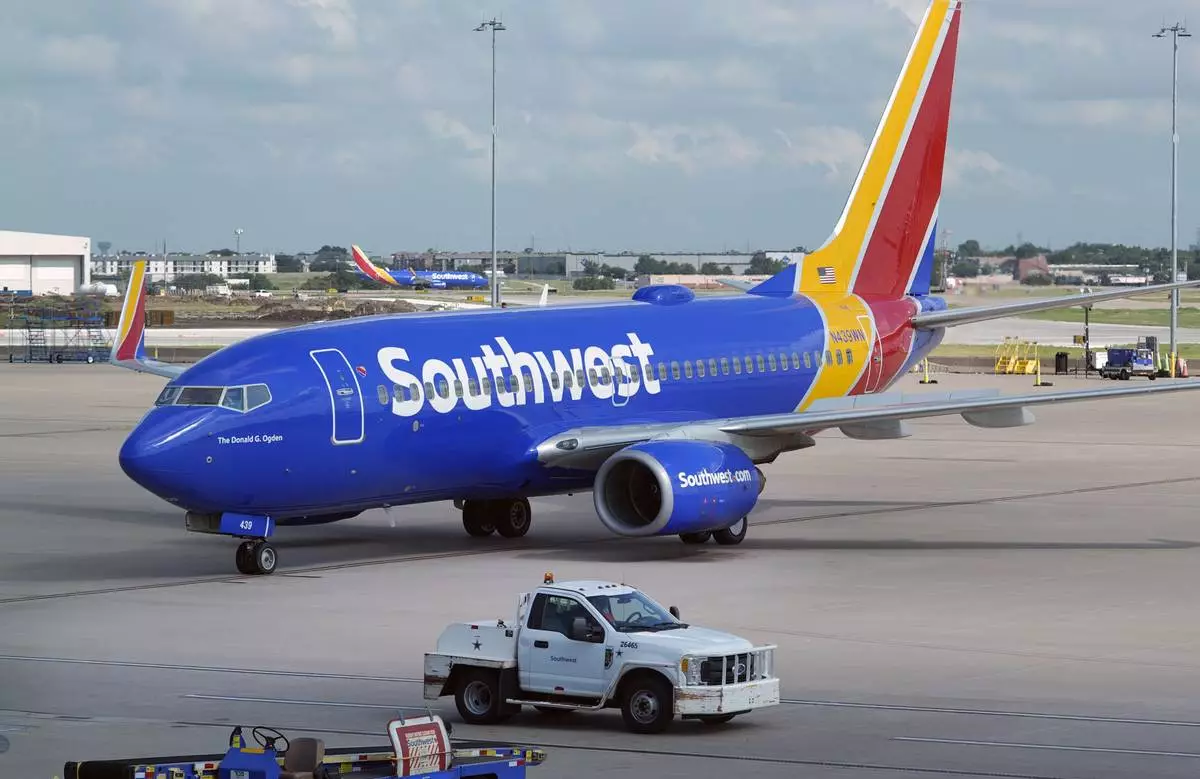
FILE - A Southwest Airlines plane moves to depart from Love Field in Dallas, July 25, 2024. (AP Photo/LM Otero, File)
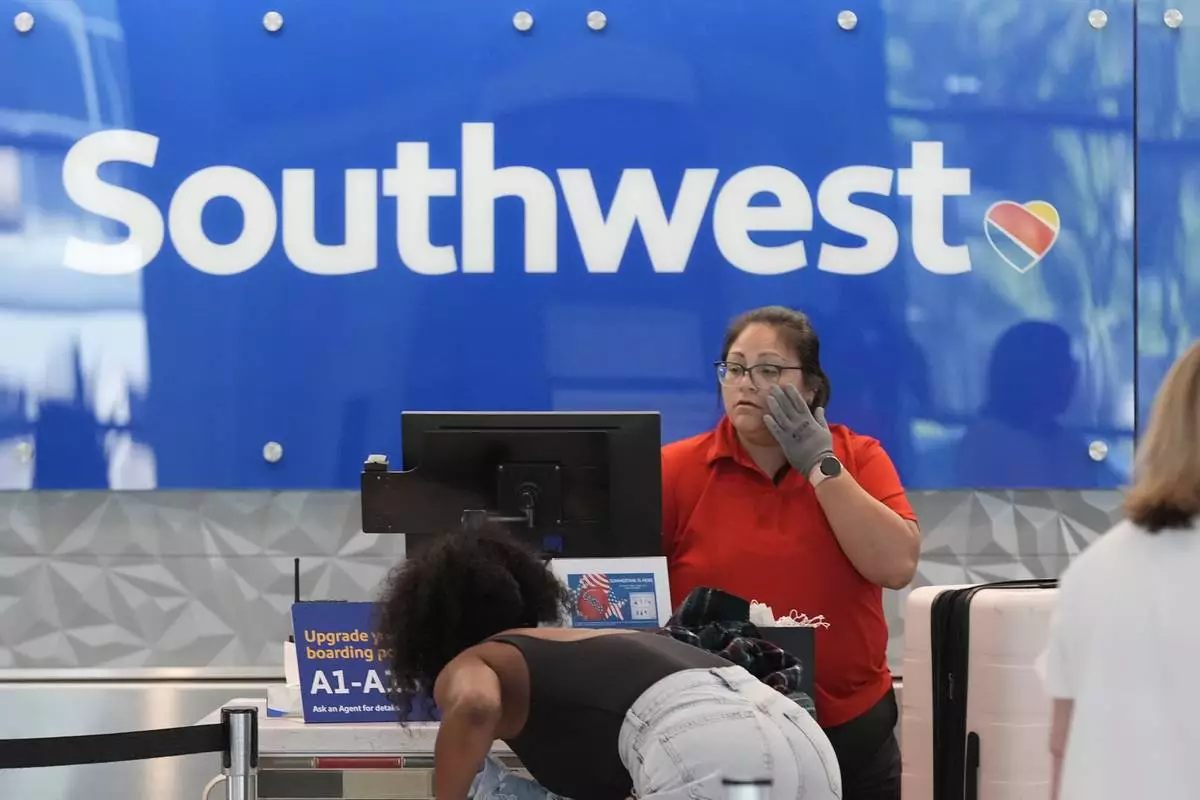
FILE - A Southwest Airlines ticket agent checks in passengers at Love Field in Dallas, July 25, 2024. (AP Photo/LM Otero, File)



